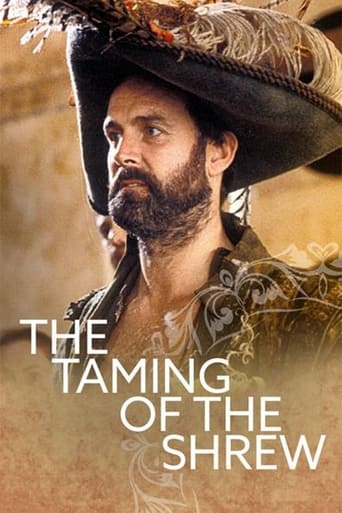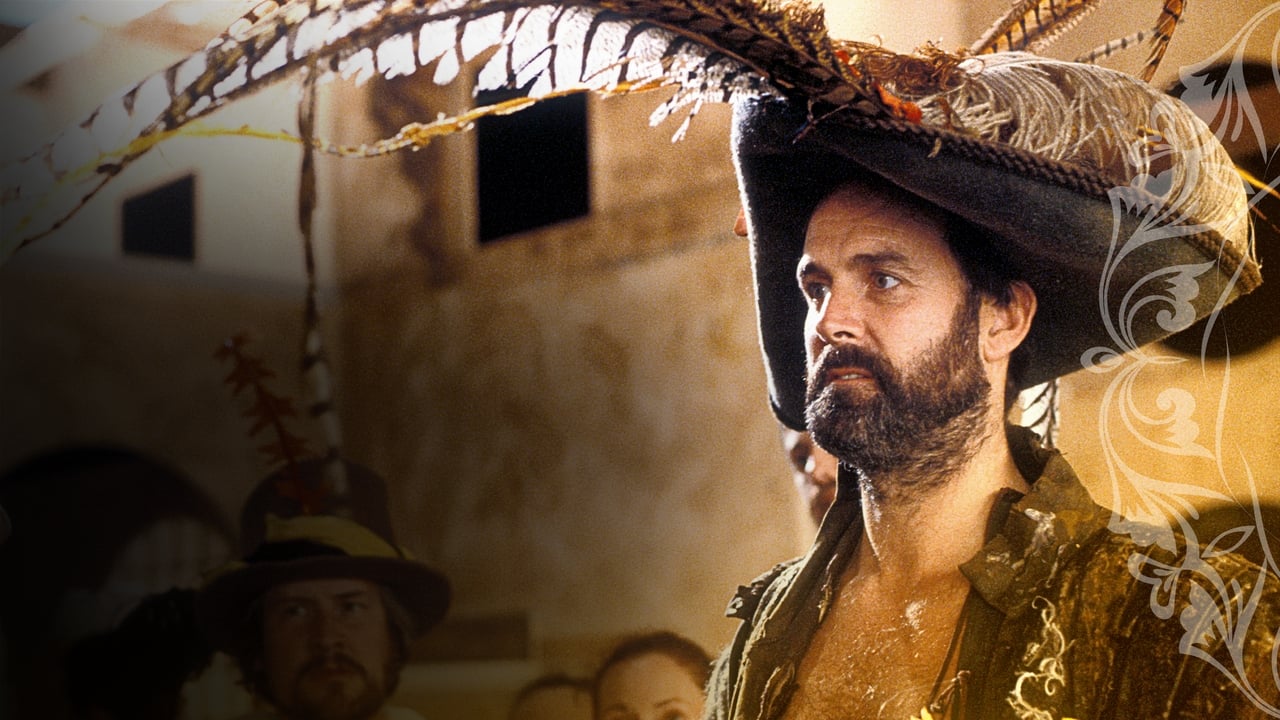mikkel_lodahl
The ProductionThe BBC produced all of Shakespeare's plays in the years around 1980 in the vein of the old 'filmed theatre' school. That is to say that the cinematography is not lush, the costumes are not impressive, the sets do not evoke a sense of realism, but the acting and the direction of the actors are at centre stage.Directed by Jonathan Miller, their Taming of the Shrew is populated by well-meaning actors who ranged from quite good – such as Anthony Pedley as the servant of young Luciano – to the merely average – such as Susan Penhaligon's Bianca.But overshadowing them all is a surprising performer in this context, the performance of whom is the key to Jonathan Miller's solution to the problem of how to film a play, that basically condones domestic violence and makes light of it: John Cleese as Petruchio.The CleeseCleese brings a quality to the boisterous role of the gentleman from Verona that it is frankly astonishing for whoever discovered it in the text to have found, and which demonstrates the range of Shakespeare's play. Where Petruchio is traditionally seen as a staunch defender of the status quo as regards to gender roles, Cleese shows him to be a quiet rebel and a person with a knack for noticing absurdity and hostility in the world and trying to make the best of it.While most productions have Petruchio dominating Kate at the end, it is obvious from the performances that such is not the case here. Rather the two have developed an understanding and an actual respect for each other.Indeed while many times the most poignant scenes for Petruchio are made out to be his battles of wit and violence with Kate, it is obvious that Cleese and the production considers the pivotal scene to be his short, poetic soliloquy at the end of act 4, scene 1.Delivered by candlelight after an exhausting day, Cleese wearily speaks the words that lesser Petruchios would be bolstering all over the place. Quietly and calmly, he outlines his plan with a tonality in his voice like that of a man who meticulously chooses exactly the most absurd response to any stimuli simply to prove a point. It is not that he must decide everything for Kate, however, but simply and reasonably that they cannot function as a married couple if they fight about everything. Thus he meets her irrational demands not with demands of his own, but instead with well-designed, absurd responses.Rather than admonish her for being wilful or engaging in a misogynist battle of the sexes, Cleese's Petruchio is on a mission to show Kate that her wilfulness simply will not do, because it is not possible for people to live like that. He demands not compliance from Kate because he wants it, but because he wants to show what she is demanding from the world.The ShrewQuite apart from the dismal message that productions of The Taming of the Shrew usually have to contend with, the message of this production is instead that we are not set in our ways and that we can change our nature if we work at it. All of this hinges of course not just on the performance of Cleese, but also on the wonderfully faceted performance of Sarah Badel in the role of Kate. She starts out in the proud tradition from Elizabeth Taylor's version in Zefirellis production from the 60s, portraying Kate as essentially a spoilt child who rebels without any sense of direction. It is clear that she finds the demands of society idiotic and inconvenient, but she does not try to change them, she just acts out her rage very much like a child would.As she struggles to comprehend Petruchio's outlandish behaviour, we see that Badel – unlike Taylor – actually uses this character choice moving forward. This is not so much a taming as a maturing of the shrew, as Kate grows up. Petruchio is holding up a mirror in front of her and like a child she at first does not recognise that it is herself she's seeing. It seems to her that Petruchio is just one more instance of a world being unreasonable, harsh and repressive, but gradually Badel shows us Kate coming to grips with the fact that the person in the mirror is her. Like a child finally recognising herself in the mirror and not attempting to play with this new friend anymore, Kate grows up and becomes a reasonable person. She learns, and we learn with her, that the proper response to an unfair world is not blind rage, disgust and self pity, but instead reason and thought. Reportedly Jonathan Miller had problems with persuading Cleese to act in this, the first Shakespeare production the comedian did. It is fortunate that he was successful, though. Although we cannot in good conscience acquit Shakespeare himself or his contemporaries of misogyny, we can however – with this production in hand – show that the text must not necessarily be interpreted thus.And this is really the most we can hope for in a performance: to show us things about the text that we had not considered.(This is a shortened version of the review posted at shakespearereviews.wordpress.com)
insomnimom
This version is not my favorite because I'm an English teacher who believes that this extremely low-key version is much too subtle to entertain students. Or me.(But then again, the Zeffirelli version is so overblown and hyperactive, I don't think it's that great either. I think I'm going to have to stick with the American Conservatory Theater's commedia dell'arte performance as my favorite filmed version. I wish so much I could find a straight version of this play on film.) My first quarrel is that Simon Chandler (Lucentio) delivers his lines so quickly in the play's opening scene that he's impossible to understand. And then there's John Cleese as Petruchio burying his face in his hands as he washes and mumbling as he splashes. It's very frustrating not to be able to understand what actors are saying and those are two of the times I noted that happening in this film.I also didn't feel that the sets contributed to the film. They were spare -- although the set for the Minola's house was very beautiful -- but they were so...beige. And the costumes were so...beige. It was almost like seeing the play in sepia tones.As far as showing the play in a classroom goes, I don't like the scene where Lucentio tries to cop a feel of Bianca's breast as he "translates Latin" for her. It seemed gratuitous, considering the plodding pace of the rest of the film. I know it's very brief, but I still found it irritating. It came out of nowhere - whoa! A hand! Trying to touch a boob! And then we're back to the snoozing.All in all, this extremely Burrrrriddish version of Shrew shows how comedy has changed over the past 400 years -- in Shakespeare's day, I imagine there was a lot more joy, a bawdy romp. This version is so terribly, terribly dull, in my opinion. I don't think the performances are brilliant. I don't sense the magic.
sarastro7
The simple truth about Shakespeare's plays - especially the comedies - is that they can be delightful beyond one's wildest imagination. I consider Much Ado About Nothing to be by far one of the most pleasant comedies of Shakespeare, but upon watching The Taming of the Shrew, I come to realize that it, when well produced, can be just as wondrous. The wisdom and humor contained in a play by the Bard are nigh-infinite, if only we have the eyes to see it.Having said that, this classic BBC production may indeed be classic, but apart from John Cleese it is fairly pedestrian. The delight, for me, comes from the words rather than the stage production, and then, of course, from John Cleese. I had my doubts about him when I heard he was in a "serious" Shakespeare play, but the second I saw him my doubts evaporated. He carries this show, being easily the best thing about it, and it should be obvious to all that Shakespeare and John Cleese is a match made in heaven - a mad mating, to use a pun from the play! One is grief-stricken that Cleese did not go into Shakespeare acting as a full career; woe is we who have spent our lives lacking a comedic giant such as Cleese in the Shakespearean art form!In short: Cleese is superb, utterly and completely. The rest of the production is adequate, but Cleese absolutely steals the show.My rating: about 6-ish for the rest of the production, with two points added for Cleese's brilliant performance, coming to an 8 out of 10.
au561
Unlike Taylor, Burton, and Zefferelli, who run roughshod over Shakespere's script and chew the scenery like buffoons; Jonathon Miller's intelligent direction and John Cleese's droll performance illuminate the true depth of the play. Cleese is ever mindful of the brilliance of Katherine's intellect and seduces rather than browbeats her to be his love. While at the same time being seduced by her mind and deeply loving heart. Not a farce as it is most often produced, but a true battle of wits, where both combatants win.



 AD
AD


